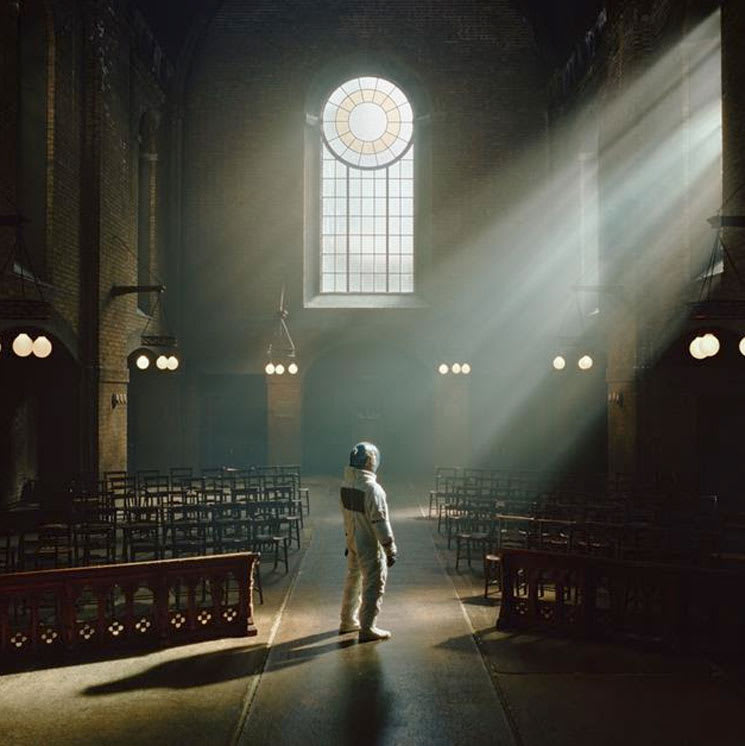In a world where vocalist Sam Carter wishes he never yelled "BLEGH" before a djent breakdown, British stalwarts Architects have reached a dire strait. They defined a generation of techy metalcore with Linkin Park choruses, but the market they created is now oversaturated. The de facto leaders of post-metalcore can either branch out or tread water as their mountain becomes a plateau. Architects' ninth album, For Those That Wish to Exist, has the unenviable task of navigating this career crossroads.
Two years after 2018's Holy Hell bounced back from the loss of guitarist-songwriter Tom Searle with emotional, impeccably executed metalcore, Architects revisit a more accessible sound akin to 2011's The Here and Now. The band doesn't look back on that first attempt fondly, establishing For Those That Wish to Exist as a chance for redemption. To that effect, "Black Lungs" explodes into unapologetic nu metal riffs and shares some incredibly catchy hooks with its swelling balladic counterpart, "Dead Butterflies." In both cases, Carter stands out with a versatile range of resonant croons, sing-screaming and abrasive snarls.
"Discourse Is Dead" is the only cut that resembles Architects' usual heaviness, but this overall reduced aggression brings with it expanded instrumentation. "Do You Dream of Armageddon" introduces the album's tasteful blend of orchestral and electronic overtones. Layers of strings, brass and choir recur throughout the album, making the likes of "Giving Blood" a bombastic twist on Minutes to Midnight-era Linkin Park. In the same way, "Flight Without Feathers" builds an electro-pop dreamscape on detailed keyboards and sampled beats.
An hour leaves a lot of margin for error, but the album's production values help deeper cuts like "Demi God" or "Goliath" remain interesting. The former achieves genuine immensity through its soaring string lines, while the latter's synth patches and ambiance bridge the gap between stadium-ready refrains (complete with Biffy Clyro vocalist Simon Neil) and Architects' metalcore roots.
Still, some passages needed more creative grit. "Little Wonder" is so streamlined and unthreatening that it actually embodies Carter's lyrics: "I wanna sing you a different song / One that's easier to swallow." It becomes a meta-narrative about palatable corporate messaging, brough full circle by the muscular triplet breakdown: "They fucking had it coming." This cut and "Meteor" aren't badly performed, but could've used compositional nuance to back up the big production and catchy melodies.
Angrier cuts offer more instances of Architects retaining creative vitality while stripping back the prog-metal. Drummer Dan Searle gives "Animals" a stomping, Rammstein-ish groove, ripe for some simple, addictive riffage from guitarists Josh Middleton and Adam Christianson, along with bassist Alex Dean. The song's four-on-the-floor rhythm carries over onto "An Ordinary Extinction" and "Impermanence," in direct contrast to Searle's usual double-bass trickery. The latter finds Parkway Drive's Winston McCall at home within the metallic flourishes, packed with consistent, infectious intensity.
Whether it's the powerful, riffy "Libertine" or the delicate, lush closer "Dying Is Absolutely Safe," Architects remain comfortable and self-assured within new environments. Other than a few lapses, the hooks, synths and classical instruments effectively recontextualize Architects' musicianship. For Those That Wish to Exist proves these guys can successfully diversify their sound.
(Epitaph)Two years after 2018's Holy Hell bounced back from the loss of guitarist-songwriter Tom Searle with emotional, impeccably executed metalcore, Architects revisit a more accessible sound akin to 2011's The Here and Now. The band doesn't look back on that first attempt fondly, establishing For Those That Wish to Exist as a chance for redemption. To that effect, "Black Lungs" explodes into unapologetic nu metal riffs and shares some incredibly catchy hooks with its swelling balladic counterpart, "Dead Butterflies." In both cases, Carter stands out with a versatile range of resonant croons, sing-screaming and abrasive snarls.
"Discourse Is Dead" is the only cut that resembles Architects' usual heaviness, but this overall reduced aggression brings with it expanded instrumentation. "Do You Dream of Armageddon" introduces the album's tasteful blend of orchestral and electronic overtones. Layers of strings, brass and choir recur throughout the album, making the likes of "Giving Blood" a bombastic twist on Minutes to Midnight-era Linkin Park. In the same way, "Flight Without Feathers" builds an electro-pop dreamscape on detailed keyboards and sampled beats.
An hour leaves a lot of margin for error, but the album's production values help deeper cuts like "Demi God" or "Goliath" remain interesting. The former achieves genuine immensity through its soaring string lines, while the latter's synth patches and ambiance bridge the gap between stadium-ready refrains (complete with Biffy Clyro vocalist Simon Neil) and Architects' metalcore roots.
Still, some passages needed more creative grit. "Little Wonder" is so streamlined and unthreatening that it actually embodies Carter's lyrics: "I wanna sing you a different song / One that's easier to swallow." It becomes a meta-narrative about palatable corporate messaging, brough full circle by the muscular triplet breakdown: "They fucking had it coming." This cut and "Meteor" aren't badly performed, but could've used compositional nuance to back up the big production and catchy melodies.
Angrier cuts offer more instances of Architects retaining creative vitality while stripping back the prog-metal. Drummer Dan Searle gives "Animals" a stomping, Rammstein-ish groove, ripe for some simple, addictive riffage from guitarists Josh Middleton and Adam Christianson, along with bassist Alex Dean. The song's four-on-the-floor rhythm carries over onto "An Ordinary Extinction" and "Impermanence," in direct contrast to Searle's usual double-bass trickery. The latter finds Parkway Drive's Winston McCall at home within the metallic flourishes, packed with consistent, infectious intensity.
Whether it's the powerful, riffy "Libertine" or the delicate, lush closer "Dying Is Absolutely Safe," Architects remain comfortable and self-assured within new environments. Other than a few lapses, the hooks, synths and classical instruments effectively recontextualize Architects' musicianship. For Those That Wish to Exist proves these guys can successfully diversify their sound.




